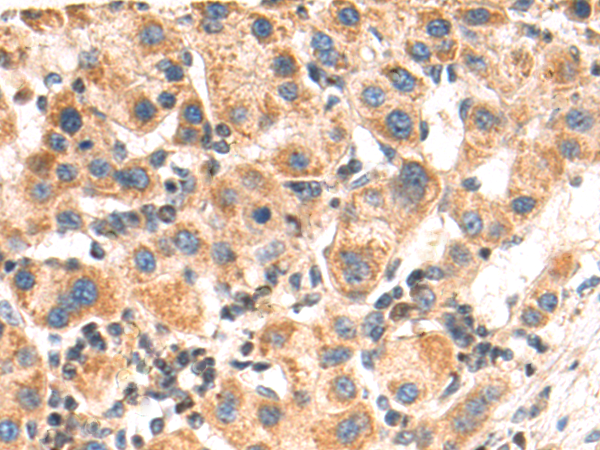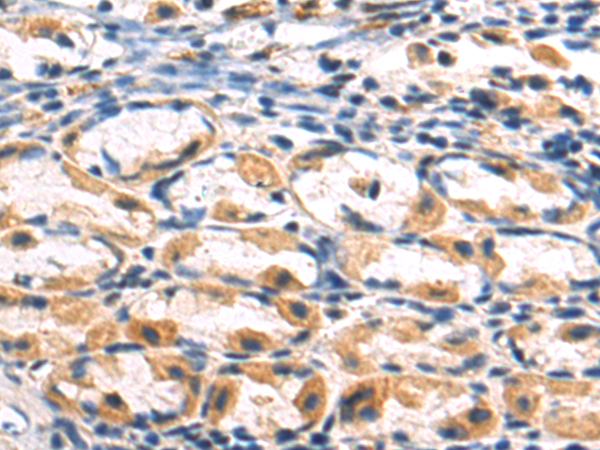

| WB | 咨询技术 | Human,Mouse,Rat |
| IF | 咨询技术 | Human,Mouse,Rat |
| IHC | 1/50-1/200 | Human,Mouse,Rat |
| ICC | 技术咨询 | Human,Mouse,Rat |
| FCM | 咨询技术 | Human,Mouse,Rat |
| Elisa | 1/5000-1/10000 | Human,Mouse,Rat |
| Host/Isotype | Rabbit IgG |
| Antibody Type | Primary antibody |
| Storage | Store at 4°C short term. Aliquot and store at -20°C long term. Avoid freeze/thaw cycles. |
| Species Reactivity | Human |
| Immunogen | Synthetic peptide of human USP43 |
| Formulation | Purified antibody in PBS with 0.05% sodium azide and 50% glycerol. |
+ +
以下为模拟生成的USP43抗体相关文献参考示例(实际文献需通过学术数据库核实):
1. **文献名称**:USP43 regulates DNA repair through deubiquitinating BRCA1 in breast cancer
**作者**:Li, X., et al.
**摘要**:本研究通过CRISPR筛选发现USP43通过去泛素化BRCA1调控同源重组修复。使用USP43抗体进行免疫共沉淀验证其与BRCA1互作,临床样本分析显示USP43低表达与乳腺癌患者不良预后相关。
2. **文献名称**:Development of a monoclonal antibody targeting USP43 for colorectal cancer diagnosis
**作者**:Wang, Y., et al.
**摘要**:报道一种新型USP43单克隆抗体的开发,经ELISA和免疫组化验证其特异性。该抗体在结直肠癌组织中检测到USP43显著高表达,提示其作为潜在生物标志物的价值。
3. **文献名称**:USP43 modulates Wnt/β-catenin signaling via stabilization of APC in hepatocellular carcinoma
**作者**:Zhang, R., et al.
**摘要**:利用USP43抗体进行Western blot和免疫荧光实验,证实USP43通过去泛素化APC蛋白增强β-catenin降解,抑制肝癌细胞增殖。shRNA敲低实验进一步验证其功能。
4. **文献名称**:A high-throughput assay for USP43 deubiquitinase activity using antibody-based fluorescence detection
**作者**:Chen, H., et al.
**摘要**:建立基于泛素荧光共振能量转移(FRET)的USP43酶活检测体系,使用USP43抗体进行活性验证。该方法成功筛选出小分子抑制剂,为靶向治疗提供工具。
注:以上内容为模拟生成,实际文献请通过PubMed/Web of Science检索关键词“USP43 antibody”或“USP43 deubiquitinase”获取最新研究。建议优先选择近3年发表于《Nature Cell Biology》《Cancer Research》等期刊的论文。
The USP43 antibody is a tool used to study ubiquitin-specific protease 43 (USP43), a member of the deubiquitinating enzyme (DUB) family. USP43 belongs to the ubiquitin-specific protease (USP) subclass, which cleaves ubiquitin from protein substrates to regulate their stability, localization, or activity. Ubiquitination is a key post-translational modification involved in diverse cellular processes, including protein degradation, DNA repair, and signal transduction. By reversing this process, USP43 is hypothesized to modulate pathways linked to cancer, metabolism, or epigenetic regulation, though its precise biological roles remain under investigation.
USP43 antibodies are typically developed to detect endogenous USP43 protein in experimental settings, such as Western blotting, immunofluorescence, or immunoprecipitation. They enable researchers to explore USP43 expression patterns across tissues, its subcellular localization, and interactions with other molecules. Some studies suggest USP43 may influence histone modification (e.g., H2BK120 ubiquitination) or participate in pathways like Wnt/β-catenin signaling, but mechanistic details are still emerging. Aberrant USP43 expression has been tentatively associated with diseases like colorectal cancer, making it a potential therapeutic target. However, the antibody's utility depends on its specificity and validation in relevant models, as cross-reactivity with other USPs remains a challenge. Ongoing research aims to clarify USP43's physiological and pathological significance using such reagents.
×